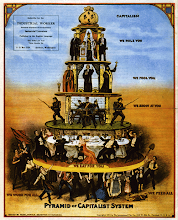Much of the rhetoric dismissing the relevancy of Marx and the school of thought he fathered is a focus on his alleged predictions or so-called prophecies about the overthrow of capitalism and the establishment of socialism. The reasoning is: it hasn't happened yet, therefore it never will, therefore Marx and Marxism is wrong about everything. To be sure, the overthrow of capitalism and the establishement of a socialist society actually directed by its working class is a real problem.
Regardless, the real value in Marx can be found in the theoretical tool kit he developed to critique capitalism. This theory and critique I think is still valid irrelevant of the possibility of a socialist future. And the critique can be used to either reform capitalism in to its most favorable condition, or as an argument to end it.
The following I think is a concise statement of Marx's project from Daniel Little , professor of the philosophy of social science at his blog UnderstandingSociety:
"The most basic goal of Marx's economic programme was to demystify the workings of the political economy of capitalism. He wanted to sweep aside the appearances that capitalism presents and to lay bare the underlying social relations of inequality and exploitation that really constituted the causal core of the system. (This is the point of his theory of the fetishism of commodities; link.) And he believed that active systems of ideology and false consciousness conspired to conceal these workings from ordinary participants. In particular, he wanted to demonstrate the process through which wealth is created within capitalism, and the relations of inequality through which its benefits are distributed. It is a class-based analysis, and Marx proposes to the proletariat (and the rest of us) that we look for the class mechanisms of our ordinary economic experiences."
Daniel Little goes on to state that the problem is that this is a schematic theory, and there still needs to be empirical data and analysis of the problems of capitalism as it is lived today. I cannot agree more.




No comments:
Post a Comment